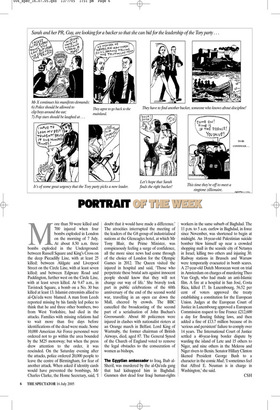PORTRAIT OF THE WEEK M ore than 50 were killed and
700 injured when four bombs exploded in London on the morning of 7 July. At about 8.50 a.m. three bombs exploded in the Underground: between Russell Square and King’s Cross on the deep Piccadilly Line, with at least 25 killed; between Aldgate and Liverpool Street on the Circle Line, with at least seven killed; and between Edgware Road and Paddington, further west on the Circle Line, with at least seven killed. At 9.47 a.m., in Tavistock Square, a bomb on a No. 30 bus killed at least 13. Islamist extremists allied to al-Qa’eda were blamed. A man from Leeds reported missing by his family led police to think that he and three other bombers, two from West Yorkshire, had died in the attacks. Families with missing relations had to wait more than five days before identifications of the dead were made. Some 10,000 American Air Force personnel were ordered not to go within the area bounded by the M25 motorway; but when the press drew attention to the order, it was rescinded. On the Saturday evening after the attacks, police ordered 20,000 people to leave the centre of Birmingham, for fear of another attack. When asked if identity cards would have prevented the bombings, Mr Charles Clarke, the Home Secretary, said, ‘I doubt that it would have made a difference.’ The atrocities interrupted the meeting of the leaders of the G8 group of industrialised nations at the Gleneagles hotel, at which Mr Tony Blair, the Prime Minister, was conspicuously feeling a surge of confidence, all the more since news had come through of the choice of London for the Olympic Games in 2012. The Queen visited the injured in hospital and said, ‘Those who perpetrate these brutal acts against innocent people should know that they will not change our way of life.’ She bravely took part in public celebrations of the 60th anniversary of the end of the second world war, travelling in an open car down the Mall, cheered by crowds. The BBC cancelled the broadcasting of the second part of a serialisation of John Buchan’s Greenmantle. About 80 policemen were injured in clashes with nationalist rioters at an Orange march in Belfast. Lord King of Wartnaby, the former chairman of British Airways, died, aged 87. The General Synod of the Church of England voted to remove the legal obstacles to the consecration of women as bishops. workers in the same suburb of Baghdad. The 11 p.m. to 5 a.m. curfew in Baghdad, in force since November, was shortened to begin at midnight. An 18-year-old Palestinian suicide bomber blew himself up near a crowded shopping mall in the seaside city of Netanya in Israel, killing two others and injuring 30. Railway stations in Brussels and Warsaw were temporarily evacuated in bomb scares. A 27-year-old Dutch Moroccan went on trial in Amsterdam on charges of murdering Theo Van Gogh, who had made an anti-Islamic film. A fire at a hospital in San José, Costa Rica, killed 17. In Luxembourg, 56.52 per cent of voters approved the treaty establishing a constitution for the European Union. Judges at the European Court of Justice in Luxembourg approved a European Commission request to fine France £212,600 a day for flouting fishing laws, and then added a fine of £13.7 million because of its ‘serious and persistent’ failure to comply over 14 years. The International Court of Justice settled a 40-year-long border dispute by warding the island of Lete and 15 others to Niger, and nine others in the Mekrou and Niger rivers to Benin. Senator Hillary Clinton likened President George Bush to a character in the comic Mad; ‘I sometimes feel that Alfred E. Neuman is in charge in Washington,’ she said.


























































 Previous page
Previous page